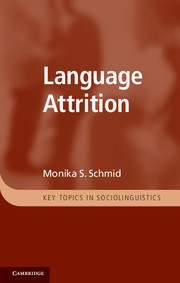Book contents
- Frontmatter
- Contents
- List of figures
- List of tables
- Preface
- Abbreviations
- 1 Introduction
- Part I Linguistic aspects of language attrition
- Part II Extralinguistic aspects of language attrition
- Part III Conducting research on language attrition – preliminary considerations
- Part IV Experimental designs for attrition research – the language attrition test battery
- Part V Coding and analysing the data
- 18 Conclusion
- Glossary
- Notes
- References
- Index
Part III - Conducting research on language attrition – preliminary considerations
Published online by Cambridge University Press: 05 June 2012
- Frontmatter
- Contents
- List of figures
- List of tables
- Preface
- Abbreviations
- 1 Introduction
- Part I Linguistic aspects of language attrition
- Part II Extralinguistic aspects of language attrition
- Part III Conducting research on language attrition – preliminary considerations
- Part IV Experimental designs for attrition research – the language attrition test battery
- Part V Coding and analysing the data
- 18 Conclusion
- Glossary
- Notes
- References
- Index
Summary
In Part I of this book, you were introduced to the phenomenon of language attrition. Chapters 3–5 describe how attrition can manifest itself in a first language – in what way the lexical, grammatical, phonological and pragmatic repertoire of a speaker may be affected. In Part II, an overview was given of the extralinguistic individual, social and attitudinal factors which may influence this process.
The question now is how to translate this theoretical knowledge into practical research, how to design and set up a study, how to carry it out, and how to classify, analyse and interpret your data. Part III summarizes the issues that you need to consider when you conduct your own investigation of language attrition.
PRELIMINARY CONSIDERATIONS
Alice … went on: ‘Would you tell me, please, which way I ought to go from here?’
‘That depends a good deal on where you want to get to,’ said the Cat.
‘I don't much care where’ said Alice.
‘Then it doesn't matter which way you go,’ said the Cat.
‘– so long as I get somewhere,’ Alice added as an explanation.
‘Oh, you're sure to do that,’ said the Cat, ‘if you only walk long enough.’
(Lewis Carroll, Alice's Adventures in Wonderland)This exchange between Alice and the Cheshire Cat is a good illustration of the way in which research on language attrition has often been approached. In many studies no explicit aim or target of the investigation was set beforehand, nor were the means of getting to this target clearly specified.
- Type
- Chapter
- Information
- Language Attrition , pp. 107 - 108Publisher: Cambridge University PressPrint publication year: 2011



